Yi Jing Hexagram 4 - Line 6
The hexagram: 4
An hexagram is a combination of six yin and yang lines.

4.6 (4 > 7) - THE MĂNG HEXAGRAM
In the topmost line, undivided, we see one smiting the ignorant (youth). But no advantage will come from doing him an injury. Advantage would come from warding off injury from him.
Bing DeepL Google Yandex4.6 (4 > 7) - Meng, la stupidité juvénile
Meng : Intelligence non encore développée ; être non encore formé.
Si l’on châtie l’ignorant en le formant, on ne doit point lui faire de tort, mais au contraire l’en préserver.
Bing DeepL Google YandexThe trigrams
The trigrams are combinations of three yin and yang lines. The three bottom lines of the hexagram form the lower trigram and represent the inner situation. The three top lines form the upper trigram and represent the outer situation.
trigSup2


trigInf

The nuclear hexagram: 24
The nuclear hexagram is the association of the two inner trigrams (lines 2,3,4 and 3,4,5). It represents the root, or the origin of the situation.

24 - THE FÛ HEXAGRAM.
Fû indicates that there will be free course and progress (in what it denotes). (The subject of it) finds no one to distress him in his exits and entrances; friends come to him, and no error is committed. He will return and repeat his (proper) course. In seven days comes his return. There will be advantage in whatever direction movement is made.
Bing DeepL Google Yandex24 - Fû, le retour
Fū : réparation, correction, amendement, retour à l’état originaire
Texte
Si dans ses rapports, ses actes, on n’offense pas, les amis viendront et l’on ne faiblira pas. Si l’on corrige sa conduite dans ses actes journaliers, pendant sept jours, on réussira dans tout ce qu’on entreprendra.
Symbolisme
La terre au-dessus du tonnerre. Les anciens rois, au jour du solstice (ou, au septième jour) fermaient les frontières. Les marchands et les voyageurs ne pouvaient plus passer ; les princes ne pouvaient inspecter les régions. C’était une sorte de repos, d’inaction forcée, comme celle du tonnerre enfermé, tenu sous terre dans l’hexagramme. De là cette citation.
Commentaire
Se corriger est chose heureuse quand on s’amende fermement. Il en arrivera comme il est dit au texte, si l’on agit avec condescendance et soumission aux règles. Se corriger, comme il est dit, est la manière d’agir du ciel. On réussira ; la force, la fermeté grandira. En cela ne voyons-nous pas le coeur du ciel et de la terre ?
The derived (Fan Yao)
The same line number on the mutated hexagram. It reperesents what can be done AFTER to correct the situation described by this line, as a sort of remedy or solution.
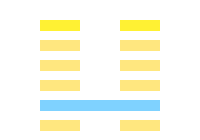
7.6 (7 > 4) - THE SZE HEXAGRAM.
The topmost line, divided, shows the great ruler delivering his charges, (appointing some) to be rulers of states, and others to undertake the headship of clans ; but small men should not be employed (in such positions).
Bing DeepL Google Yandex7.6 (7 > 4) - Restoring discipline
It is time to restore order after action and for that one will need people who are willing to do what one commands.
Bing DeepL Google Yandex7.6 (7 > 4) - Restoring discipline
It is time to restore order after action and for that one will need people who are willing to do what one commands.
Bing DeepL Google Yandex7.6 (7 > 4) - Sze, l’armée
Sze : chef ; troupes, armée ; peuple, foule.
Un grand prince qui a obtenu le mandat céleste crée heureusement un puissant État et donne la stabilité à sa dynastie. Un homme ordinaire ne sait pas y réussir (ne doit pas être employé).
Bing DeepL Google Yandex7.6 (7 > 4) - Rétablir la discipline
Il est temps de remettre de l'ordre après l'action, et pour cela on aura besoin de gens qui sont prêts à faire ce qu'on ordonne.
Bing DeepL Google Yandex7.6 (7 > 4) - Az akarat
A fellépés után itt az ideje a rend helyreállításának és ehhez szakértőket kell igénybe venni.
Bing DeepL Google YandexThe juncture: 8.1
The derived of the reciprocal. It represents what could have been done BEFORE to prevent the situation described by this line, as a sort of remedy or solution.
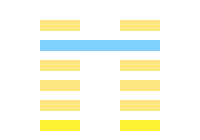
8.1 (8 > 3) - THE PÎ HEXAGRAM.
he first line, divided, shows its subject seeking by his sincerity to win the attachment of his object. There will be no error. Let (the breast) be full of sincerity as an earthenware vessel is of its contents, and it will in the end bring other advantages.
Bing DeepL Google Yandex8.1 (8 > 3) - Coming from the other side
One is tired of the delays caused by checks, so one modestly asks the other to come back to finish what they have started, when they are done showing their results to others.
Bing DeepL Google Yandex8.1 (8 > 3) - Coming from the other side
One is tired of the delays caused by checks, so one modestly asks the other to come back to finish what they have started, when they are done showing their results to others.
Bing DeepL Google Yandex8.1 (8 > 3) - Pî, la solidarité
Pî : union, harmonie, rapprochement, aide
A l’homme sincère, on s’unit aisément. L’homme droit et ami de la concorde doit être plein de cet esprit comme un vase de terre rempli (de vin ou de fruits). Il lui en viendra toujours de nouveaux avantages.
Bing DeepL Google Yandex8.1 (8 > 3) - Venir de l'autre côté
On est fatigué par les retards causés par les vérifications, alors on demande modestement à l'autre de revenir pour terminer ce qu'il a entrepris, quand il aura fini de montrer son résultat aux autres.
Bing DeepL Google Yandex8.1 (8 > 3) - Elosztás
Fáradt az ellenőrzések okozta késlekedések miatt, így szerényen arra kéri a másikat hogy cserélje ki amit kaptak és ha kész mutassa be az eredményt a többieknek.
Bing DeepL Google YandexThe reciprocal: 3.1
The hexagram upside down. It represents the opposite situation, and as such is insturmental when validating comments.

3.1 (3 > 8) - THE KUN HEXAGRAM
The first line, undivided, shows the difficulty (its subject has) in advancing. It will be advantageous for him to abide correct and firm; advantageous (also) to be made a feudal ruler.
Bing DeepL Google Yandex3.1 (3 > 8) - Resolving difficulties
When others ask for help, if one accepts despite the constraints then one sets an example.
Bing DeepL Google Yandex3.1 (3 > 8) - Resolving difficulties
When others ask for help, if one accepts despite the constraints then one sets an example.
Bing DeepL Google Yandex3.1 (3 > 8) - T’un, la difficulté initiale
T’un et tchun : A. 1. Bourgeon, pousse ; 2. Croissance, activité ; 3. Grandir, avancer. — B. Difficultés, arrêté dans son avancement, échec.
Pour s’établir solidement, il faut se maintenir en fermeté et droiture. (Pour maintenir le royaume), il est bon de constituer des chefs féodaux. Bien qu’on ait des difficultés, la volonté doit toujours s’attacher au devoir. Si, bien qu’élevé, on condescend aux besoins des petits, on s’attachera fortement le peuple.
Bing DeepL Google Yandex3.1 (3 > 8) - Remédier aux difficultés
Quand les autres demandent de l'aide, si l'on accepte malgré les contraintes alors on donne un exemple.
Bing DeepL Google Yandex3.1 (3 > 8) - Megoldás
Példamutató ha valaki mások segítségére siet a nehézségek ellenére.
Bing DeepL Google YandexMutations

4.6 (4 > 7) - THE MĂNG HEXAGRAM
In the topmost line, undivided, we see one smiting the ignorant (youth). But no advantage will come from doing him an injury. Advantage would come from warding off injury from him.
Bing DeepL Google Yandex4.6 (4 > 7) - Meng, la stupidité juvénile
Meng : Intelligence non encore développée ; être non encore formé.
Si l’on châtie l’ignorant en le formant, on ne doit point lui faire de tort, mais au contraire l’en préserver.
Bing DeepL Google Yandex
4.1.6 (4 > 19) - THE MĂNG HEXAGRAM
- 1. The first line, divided, (has respect to) the dispelling of ignorance. It will be advantageous to use punishment (for that purpose), and to remove the shackles (from the mind). But going on in that way (of punishment) will give occasion for regret.
- 6. In the topmost line, undivided, we see one smiting the ignorant (youth). But no advantage will come from doing him an injury. Advantage would come from warding off injury from him.
4.1.6 (4 > 19) - Questioning
One believes that others are waiting for answers when they do not want to be taught lessons.
Bing DeepL Google Yandex4.1.6 (4 > 19) - Questioning
One believes that others are waiting for answers when they do not want to be taught lessons.
Bing DeepL Google Yandex4.1.6 (4 > 19) - Meng, la stupidité juvénile
Meng : Intelligence non encore développée ; être non encore formé.
-
1. Pour dissiper l’ignorance, il faut user des châtiments.
Pour maintenir les règles en vigueur.
Il faut user d’avertissements et de punitions pour écarter toute cause de regret. - 6. Si l’on châtie l’ignorant en le formant, on ne doit point lui faire de tort, mais au contraire l’en préserver.
4.1.6 (4 > 19) - Interroger
On croit que les autres attendent des réponses alors qu'ils ne veulent pas qu'on leur donne de leçons.
Bing DeepL Google Yandex4.1.6 (4 > 19) - Tanácskérés
- 1. Megmutatni a tanulónak a határokat amiken nem léphet túl, majd bizalmat adni neki.
- 6. Elutasítani akik átlépik a határokat.
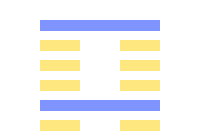
4.2.6 (4 > 2) - THE MĂNG HEXAGRAM
- 2. The second line, undivided, (shows its subject) exercising forbearance with the ignorant, in which there will be good fortune; and admitting (even the goodness of women, which will also be fortunate. (He may be described also as) a son able to (sustain the burden of) his family.
- 6. In the topmost line, undivided, we see one smiting the ignorant (youth). But no advantage will come from doing him an injury. Advantage would come from warding off injury from him.
4.2.6 (4 > 2) - Questioning
One must be available at the right time to accommodate those who seek shelter.
Bing DeepL Google Yandex4.2.6 (4 > 2) - Questioning
One must be available at the right time to accommodate those who seek shelter.
Bing DeepL Google Yandex4.2.6 (4 > 2) - Meng, la stupidité juvénile
Meng : Intelligence non encore développée ; être non encore formé.
-
2. Il est bien de se préoccuper de l’ignorant et de soutenir la jeune fille. Ainsi, ils pourront triompher de leur ignorance.
L’enfant fait durer la famille ; il faut en avoir soin.
Le fort et le faible doivent s’entraider. - 6. Si l’on châtie l’ignorant en le formant, on ne doit point lui faire de tort, mais au contraire l’en préserver.
4.2.6 (4 > 2) - Interroger
On doit être disponible au bon moment pour accueillir ceux qui demandent un abri.
Bing DeepL Google Yandex4.2.6 (4 > 2) - Tanácskérés
- 2. Ha valaki barátságos és bizalmas tanár, bíznak benne.
- 6. Elutasítani akik átlépik a határokat.
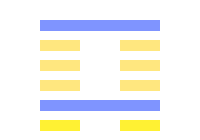
4.1.2.6 (4 > 24) - THE MĂNG HEXAGRAM
- 1. The first line, divided, (has respect to) the dispelling of ignorance. It will be advantageous to use punishment (for that purpose), and to remove the shackles (from the mind). But going on in that way (of punishment) will give occasion for regret.
- 2. The second line, undivided, (shows its subject) exercising forbearance with the ignorant, in which there will be good fortune; and admitting (even the goodness of women, which will also be fortunate. (He may be described also as) a son able to (sustain the burden of) his family.
- 6. In the topmost line, undivided, we see one smiting the ignorant (youth). But no advantage will come from doing him an injury. Advantage would come from warding off injury from him.
4.1.2.6 (4 > 24) - Questioning
One speaks as if others didn't know what to do.
Bing DeepL Google Yandex4.1.2.6 (4 > 24) - Questioning
One speaks as if others didn't know what to do.
Bing DeepL Google Yandex4.1.2.6 (4 > 24) - Meng, la stupidité juvénile
Meng : Intelligence non encore développée ; être non encore formé.
-
1. Pour dissiper l’ignorance, il faut user des châtiments.
Pour maintenir les règles en vigueur.
Il faut user d’avertissements et de punitions pour écarter toute cause de regret. -
2. Il est bien de se préoccuper de l’ignorant et de soutenir la jeune fille. Ainsi, ils pourront triompher de leur ignorance.
L’enfant fait durer la famille ; il faut en avoir soin.
Le fort et le faible doivent s’entraider. - 6. Si l’on châtie l’ignorant en le formant, on ne doit point lui faire de tort, mais au contraire l’en préserver.
4.1.2.6 (4 > 24) - Interroger
On parle comme si les autres ne savaient pas ce qu'il faut faire.
Bing DeepL Google Yandex4.1.2.6 (4 > 24) - Tanácskérés
- 1. Megmutatni a tanulónak a határokat amiken nem léphet túl, majd bizalmat adni neki.
- 2. Ha valaki barátságos és bizalmas tanár, bíznak benne.
- 6. Elutasítani akik átlépik a határokat.

4.3.6 (4 > 46) - THE MĂNG HEXAGRAM
- 3. The third line, divided, (seems to say) that one should not marry a woman whose emblem it might be, for that, when she sees a man of wealth, she will not keep her person from him, and in no wise will advantage come from her.
- 6. In the topmost line, undivided, we see one smiting the ignorant (youth). But no advantage will come from doing him an injury. Advantage would come from warding off injury from him.
4.3.6 (4 > 46) - Questioning
One would like to ward off those who are too close.
Bing DeepL Google Yandex4.3.6 (4 > 46) - Questioning
One would like to ward off those who are too close.
Bing DeepL Google Yandex4.3.6 (4 > 46) - Meng, la stupidité juvénile
Meng : Intelligence non encore développée ; être non encore formé.
-
3. N’épousez pas une fille si elle ne considère que l’or, si elle ne se possède pas elle-même ; cela ne serait pas heureux.
Ce ne serait point agir convenablement.
C’est-à-dire une fille ayant la qualité dont il s’agit n’est pas à épouser. - 6. Si l’on châtie l’ignorant en le formant, on ne doit point lui faire de tort, mais au contraire l’en préserver.
4.3.6 (4 > 46) - Interroger
On voudrait éloigner ceux qui sont trop proches.
Bing DeepL Google Yandex4.3.6 (4 > 46) - Tanácskérés
- 3. Nem engedhet a fiatalabbak türelmetlenségének.
- 6. Elutasítani akik átlépik a határokat.

4.1.3.6 (4 > 11) - THE MĂNG HEXAGRAM
- 1. The first line, divided, (has respect to) the dispelling of ignorance. It will be advantageous to use punishment (for that purpose), and to remove the shackles (from the mind). But going on in that way (of punishment) will give occasion for regret.
- 3. The third line, divided, (seems to say) that one should not marry a woman whose emblem it might be, for that, when she sees a man of wealth, she will not keep her person from him, and in no wise will advantage come from her.
- 6. In the topmost line, undivided, we see one smiting the ignorant (youth). But no advantage will come from doing him an injury. Advantage would come from warding off injury from him.
4.1.3.6 (4 > 11) - Receiving unexpected news
One calls someone to tell them what they think of their neighbours.
Bing DeepL Google Yandex4.1.3.6 (4 > 11) - Receiving unexpected news
One calls someone to tell them what they think of their neighbors.
Bing DeepL Google Yandex4.1.3.6 (4 > 11) - Meng, la stupidité juvénile
Meng : Intelligence non encore développée ; être non encore formé.
-
1. Pour dissiper l’ignorance, il faut user des châtiments.
Pour maintenir les règles en vigueur.
Il faut user d’avertissements et de punitions pour écarter toute cause de regret. -
3. N’épousez pas une fille si elle ne considère que l’or, si elle ne se possède pas elle-même ; cela ne serait pas heureux.
Ce ne serait point agir convenablement.
C’est-à-dire une fille ayant la qualité dont il s’agit n’est pas à épouser. - 6. Si l’on châtie l’ignorant en le formant, on ne doit point lui faire de tort, mais au contraire l’en préserver.
4.1.3.6 (4 > 11) - Recevoir des nouvelles imprévues
On appelle quelqu'un pour lui dire ce qu'on pense de ses voisins.
Bing DeepL Google Yandex4.1.3.6 (4 > 11) - Tanácskérés
- 1. Megmutatni a tanulónak a határokat amiken nem léphet túl, majd bizalmat adni neki.
- 3. Nem engedhet a fiatalabbak türelmetlenségének.
- 6. Elutasítani akik átlépik a határokat.
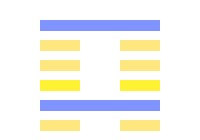
4.2.3.6 (4 > 15) - THE MĂNG HEXAGRAM
- 2. The second line, undivided, (shows its subject) exercising forbearance with the ignorant, in which there will be good fortune; and admitting (even the goodness of women, which will also be fortunate. (He may be described also as) a son able to (sustain the burden of) his family.
- 3. The third line, divided, (seems to say) that one should not marry a woman whose emblem it might be, for that, when she sees a man of wealth, she will not keep her person from him, and in no wise will advantage come from her.
- 6. In the topmost line, undivided, we see one smiting the ignorant (youth). But no advantage will come from doing him an injury. Advantage would come from warding off injury from him.
4.2.3.6 (4 > 15) - Questioning
One follows plans that others would very much like to know.
Bing DeepL Google Yandex4.2.3.6 (4 > 15) - Questioning
One follows plans that others would very much like to know.
Bing DeepL Google Yandex4.2.3.6 (4 > 15) - Meng, la stupidité juvénile
Meng : Intelligence non encore développée ; être non encore formé.
-
2. Il est bien de se préoccuper de l’ignorant et de soutenir la jeune fille. Ainsi, ils pourront triompher de leur ignorance.
L’enfant fait durer la famille ; il faut en avoir soin.
Le fort et le faible doivent s’entraider. -
3. N’épousez pas une fille si elle ne considère que l’or, si elle ne se possède pas elle-même ; cela ne serait pas heureux.
Ce ne serait point agir convenablement.
C’est-à-dire une fille ayant la qualité dont il s’agit n’est pas à épouser. - 6. Si l’on châtie l’ignorant en le formant, on ne doit point lui faire de tort, mais au contraire l’en préserver.
4.2.3.6 (4 > 15) - Interroger
On suit des plans que les autres voudraient bien connaître.
Bing DeepL Google Yandex4.2.3.6 (4 > 15) - Tanácskérés
- 2. Ha valaki barátságos és bizalmas tanár, bíznak benne.
- 3. Nem engedhet a fiatalabbak türelmetlenségének.
- 6. Elutasítani akik átlépik a határokat.
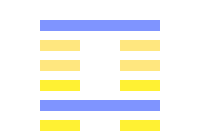
4.1.2.3.6 (4 > 36) - THE MĂNG HEXAGRAM
- 1. The first line, divided, (has respect to) the dispelling of ignorance. It will be advantageous to use punishment (for that purpose), and to remove the shackles (from the mind). But going on in that way (of punishment) will give occasion for regret.
- 2. The second line, undivided, (shows its subject) exercising forbearance with the ignorant, in which there will be good fortune; and admitting (even the goodness of women, which will also be fortunate. (He may be described also as) a son able to (sustain the burden of) his family.
- 3. The third line, divided, (seems to say) that one should not marry a woman whose emblem it might be, for that, when she sees a man of wealth, she will not keep her person from him, and in no wise will advantage come from her.
- 6. In the topmost line, undivided, we see one smiting the ignorant (youth). But no advantage will come from doing him an injury. Advantage would come from warding off injury from him.
4.1.2.3.6 (4 > 36) - Expecting an unlikely success
One raises a point that requires the attention of all those who want to be successful.
Bing DeepL Google Yandex4.1.2.3.6 (4 > 36) - Expecting an unlikely success
One raises a point that requires the attention of all those who want to be successful.
Bing DeepL Google Yandex4.1.2.3.6 (4 > 36) - Meng, la stupidité juvénile
Meng : Intelligence non encore développée ; être non encore formé.
-
1. Pour dissiper l’ignorance, il faut user des châtiments.
Pour maintenir les règles en vigueur.
Il faut user d’avertissements et de punitions pour écarter toute cause de regret. -
2. Il est bien de se préoccuper de l’ignorant et de soutenir la jeune fille. Ainsi, ils pourront triompher de leur ignorance.
L’enfant fait durer la famille ; il faut en avoir soin.
Le fort et le faible doivent s’entraider. -
3. N’épousez pas une fille si elle ne considère que l’or, si elle ne se possède pas elle-même ; cela ne serait pas heureux.
Ce ne serait point agir convenablement.
C’est-à-dire une fille ayant la qualité dont il s’agit n’est pas à épouser. - 6. Si l’on châtie l’ignorant en le formant, on ne doit point lui faire de tort, mais au contraire l’en préserver.
4.1.2.3.6 (4 > 36) - Espérer une réussite improbable
On soulève un point qui demande l'attention de tous ceux qui souhaitent connaître le succès.
Bing DeepL Google Yandex4.1.2.3.6 (4 > 36) - Tanácskérés
- 1. Megmutatni a tanulónak a határokat amiken nem léphet túl, majd bizalmat adni neki.
- 2. Ha valaki barátságos és bizalmas tanár, bíznak benne.
- 3. Nem engedhet a fiatalabbak türelmetlenségének.
- 6. Elutasítani akik átlépik a határokat.

4.4.6 (4 > 40) - THE MĂNG HEXAGRAM
- 4. The fourth line, divided, (shows its subject as if) bound in chains of ignorance. There will be occasion for regret.
- 6. In the topmost line, undivided, we see one smiting the ignorant (youth). But no advantage will come from doing him an injury. Advantage would come from warding off injury from him.
4.4.6 (4 > 40) - Questioning
One undertakes actions that lead to choices that are difficult to justify.
Bing DeepL Google Yandex4.4.6 (4 > 40) - Questioning
One undertakes actions that lead to choices that are difficult to justify.
Bing DeepL Google Yandex4.4.6 (4 > 40) - Meng, la stupidité juvénile
Meng : Intelligence non encore développée ; être non encore formé.
- 4. L’ignorance pauvre et abandonnée est chose funeste. L’abandon, l’isolement tient éloignée la possession de la vérité.
- 6. Si l’on châtie l’ignorant en le formant, on ne doit point lui faire de tort, mais au contraire l’en préserver.
4.4.6 (4 > 40) - Interroger
On entreprend des actions qui mènent à des choix difficiles à défendre.
Bing DeepL Google Yandex4.4.6 (4 > 40) - Tanácskérés
- 4. Ha valaki egyedül tanul, ez az ő döntése.
- 6. Elutasítani akik átlépik a határokat.

4.1.4.6 (4 > 54) - THE MĂNG HEXAGRAM
- 1. The first line, divided, (has respect to) the dispelling of ignorance. It will be advantageous to use punishment (for that purpose), and to remove the shackles (from the mind). But going on in that way (of punishment) will give occasion for regret.
- 4. The fourth line, divided, (shows its subject as if) bound in chains of ignorance. There will be occasion for regret.
- 6. In the topmost line, undivided, we see one smiting the ignorant (youth). But no advantage will come from doing him an injury. Advantage would come from warding off injury from him.
4.1.4.6 (4 > 54) - Giving conditional approval
One sets a prerequisite before striking a deal.
Bing DeepL Google Yandex4.1.4.6 (4 > 54) - Giving conditional approval
One sets a prerequisite before striking a deal.
Bing DeepL Google Yandex4.1.4.6 (4 > 54) - Meng, la stupidité juvénile
Meng : Intelligence non encore développée ; être non encore formé.
-
1. Pour dissiper l’ignorance, il faut user des châtiments.
Pour maintenir les règles en vigueur.
Il faut user d’avertissements et de punitions pour écarter toute cause de regret. - 4. L’ignorance pauvre et abandonnée est chose funeste. L’abandon, l’isolement tient éloignée la possession de la vérité.
- 6. Si l’on châtie l’ignorant en le formant, on ne doit point lui faire de tort, mais au contraire l’en préserver.
4.1.4.6 (4 > 54) - Donner son accord sous condition
On pose une condition préalable avant de conclure un marché.
Bing DeepL Google Yandex4.1.4.6 (4 > 54) - Tanácskérés
- 1. Megmutatni a tanulónak a határokat amiken nem léphet túl, majd bizalmat adni neki.
- 4. Ha valaki egyedül tanul, ez az ő döntése.
- 6. Elutasítani akik átlépik a határokat.
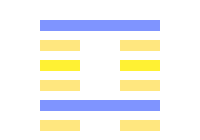
4.2.4.6 (4 > 16) - THE MĂNG HEXAGRAM
- 2. The second line, undivided, (shows its subject) exercising forbearance with the ignorant, in which there will be good fortune; and admitting (even the goodness of women, which will also be fortunate. (He may be described also as) a son able to (sustain the burden of) his family.
- 4. The fourth line, divided, (shows its subject as if) bound in chains of ignorance. There will be occasion for regret.
- 6. In the topmost line, undivided, we see one smiting the ignorant (youth). But no advantage will come from doing him an injury. Advantage would come from warding off injury from him.
4.2.4.6 (4 > 16) - Questioning
One treats the incurable diseases in the hope of relieving patients.
Bing DeepL Google Yandex4.2.4.6 (4 > 16) - Questioning
One treats the incurable diseases in the hope of relieving patients.
Bing DeepL Google Yandex4.2.4.6 (4 > 16) - Meng, la stupidité juvénile
Meng : Intelligence non encore développée ; être non encore formé.
-
2. Il est bien de se préoccuper de l’ignorant et de soutenir la jeune fille. Ainsi, ils pourront triompher de leur ignorance.
L’enfant fait durer la famille ; il faut en avoir soin.
Le fort et le faible doivent s’entraider. - 4. L’ignorance pauvre et abandonnée est chose funeste. L’abandon, l’isolement tient éloignée la possession de la vérité.
- 6. Si l’on châtie l’ignorant en le formant, on ne doit point lui faire de tort, mais au contraire l’en préserver.
4.2.4.6 (4 > 16) - Interroger
On soigne les maladies incurables dans l'espoir de soulager les patients.
Bing DeepL Google Yandex4.2.4.6 (4 > 16) - Tanácskérés
- 2. Ha valaki barátságos és bizalmas tanár, bíznak benne.
- 4. Ha valaki egyedül tanul, ez az ő döntése.
- 6. Elutasítani akik átlépik a határokat.
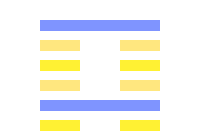
4.1.2.4.6 (4 > 51) - THE MĂNG HEXAGRAM
- 1. The first line, divided, (has respect to) the dispelling of ignorance. It will be advantageous to use punishment (for that purpose), and to remove the shackles (from the mind). But going on in that way (of punishment) will give occasion for regret.
- 2. The second line, undivided, (shows its subject) exercising forbearance with the ignorant, in which there will be good fortune; and admitting (even the goodness of women, which will also be fortunate. (He may be described also as) a son able to (sustain the burden of) his family.
- 4. The fourth line, divided, (shows its subject as if) bound in chains of ignorance. There will be occasion for regret.
- 6. In the topmost line, undivided, we see one smiting the ignorant (youth). But no advantage will come from doing him an injury. Advantage would come from warding off injury from him.
4.1.2.4.6 (4 > 51) - Questioning
One warns their allies that they will have difficulty supporting them.
Bing DeepL Google Yandex4.1.2.4.6 (4 > 51) - Questioning
One warns their allies that they will have difficulty supporting them.
Bing DeepL Google Yandex4.1.2.4.6 (4 > 51) - Meng, la stupidité juvénile
Meng : Intelligence non encore développée ; être non encore formé.
-
1. Pour dissiper l’ignorance, il faut user des châtiments.
Pour maintenir les règles en vigueur.
Il faut user d’avertissements et de punitions pour écarter toute cause de regret. -
2. Il est bien de se préoccuper de l’ignorant et de soutenir la jeune fille. Ainsi, ils pourront triompher de leur ignorance.
L’enfant fait durer la famille ; il faut en avoir soin.
Le fort et le faible doivent s’entraider. - 4. L’ignorance pauvre et abandonnée est chose funeste. L’abandon, l’isolement tient éloignée la possession de la vérité.
- 6. Si l’on châtie l’ignorant en le formant, on ne doit point lui faire de tort, mais au contraire l’en préserver.
4.1.2.4.6 (4 > 51) - Interroger
On prévient ses alliés que l'on aura du mal à les soutenir.
Bing DeepL Google Yandex4.1.2.4.6 (4 > 51) - Tanácskérés
- 1. Megmutatni a tanulónak a határokat amiken nem léphet túl, majd bizalmat adni neki.
- 2. Ha valaki barátságos és bizalmas tanár, bíznak benne.
- 4. Ha valaki egyedül tanul, ez az ő döntése.
- 6. Elutasítani akik átlépik a határokat.

4.3.4.6 (4 > 32) - THE MĂNG HEXAGRAM
- 3. The third line, divided, (seems to say) that one should not marry a woman whose emblem it might be, for that, when she sees a man of wealth, she will not keep her person from him, and in no wise will advantage come from her.
- 4. The fourth line, divided, (shows its subject as if) bound in chains of ignorance. There will be occasion for regret.
- 6. In the topmost line, undivided, we see one smiting the ignorant (youth). But no advantage will come from doing him an injury. Advantage would come from warding off injury from him.
4.3.4.6 (4 > 32) - Knowing the origin of rumours
One sees that their reputation is tainted by superficial questions.
Bing DeepL Google Yandex4.3.4.6 (4 > 32) - Knowing the origin of rumors
One sees that their reputation is tainted by superficial questions.
Bing DeepL Google Yandex4.3.4.6 (4 > 32) - Meng, la stupidité juvénile
Meng : Intelligence non encore développée ; être non encore formé.
-
3. N’épousez pas une fille si elle ne considère que l’or, si elle ne se possède pas elle-même ; cela ne serait pas heureux.
Ce ne serait point agir convenablement.
C’est-à-dire une fille ayant la qualité dont il s’agit n’est pas à épouser. - 4. L’ignorance pauvre et abandonnée est chose funeste. L’abandon, l’isolement tient éloignée la possession de la vérité.
- 6. Si l’on châtie l’ignorant en le formant, on ne doit point lui faire de tort, mais au contraire l’en préserver.
4.3.4.6 (4 > 32) - Connaître l'origine des rumeurs
On voit que sa réputation est entachée par des questions sans intérêt.
Bing DeepL Google Yandex4.3.4.6 (4 > 32) - Tanácskérés
- 3. Nem engedhet a fiatalabbak türelmetlenségének.
- 4. Ha valaki egyedül tanul, ez az ő döntése.
- 6. Elutasítani akik átlépik a határokat.

4.1.3.4.6 (4 > 34) - THE MĂNG HEXAGRAM
- 1. The first line, divided, (has respect to) the dispelling of ignorance. It will be advantageous to use punishment (for that purpose), and to remove the shackles (from the mind). But going on in that way (of punishment) will give occasion for regret.
- 3. The third line, divided, (seems to say) that one should not marry a woman whose emblem it might be, for that, when she sees a man of wealth, she will not keep her person from him, and in no wise will advantage come from her.
- 4. The fourth line, divided, (shows its subject as if) bound in chains of ignorance. There will be occasion for regret.
- 6. In the topmost line, undivided, we see one smiting the ignorant (youth). But no advantage will come from doing him an injury. Advantage would come from warding off injury from him.
4.1.3.4.6 (4 > 34) - Limiting one's domineering impulses
One speaks without regrets with those who have declared that they have no faith.
Bing DeepL Google Yandex4.1.3.4.6 (4 > 34) - Limiting one's dominating impulses
One speaks without regrets with those who have declared that they have no faith.
Bing DeepL Google Yandex4.1.3.4.6 (4 > 34) - Meng, la stupidité juvénile
Meng : Intelligence non encore développée ; être non encore formé.
-
1. Pour dissiper l’ignorance, il faut user des châtiments.
Pour maintenir les règles en vigueur.
Il faut user d’avertissements et de punitions pour écarter toute cause de regret. -
3. N’épousez pas une fille si elle ne considère que l’or, si elle ne se possède pas elle-même ; cela ne serait pas heureux.
Ce ne serait point agir convenablement.
C’est-à-dire une fille ayant la qualité dont il s’agit n’est pas à épouser. - 4. L’ignorance pauvre et abandonnée est chose funeste. L’abandon, l’isolement tient éloignée la possession de la vérité.
- 6. Si l’on châtie l’ignorant en le formant, on ne doit point lui faire de tort, mais au contraire l’en préserver.
4.1.3.4.6 (4 > 34) - Restreindre ses impulsions dominatrices
On parle sans regrets avec ceux qui ont déclaré qu'ils n'avaient pas de foi.
Bing DeepL Google Yandex4.1.3.4.6 (4 > 34) - Tanácskérés
- 1. Megmutatni a tanulónak a határokat amiken nem léphet túl, majd bizalmat adni neki.
- 3. Nem engedhet a fiatalabbak türelmetlenségének.
- 4. Ha valaki egyedül tanul, ez az ő döntése.
- 6. Elutasítani akik átlépik a határokat.
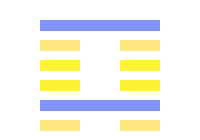
4.2.3.4.6 (4 > 62) - THE MĂNG HEXAGRAM
- 2. The second line, undivided, (shows its subject) exercising forbearance with the ignorant, in which there will be good fortune; and admitting (even the goodness of women, which will also be fortunate. (He may be described also as) a son able to (sustain the burden of) his family.
- 3. The third line, divided, (seems to say) that one should not marry a woman whose emblem it might be, for that, when she sees a man of wealth, she will not keep her person from him, and in no wise will advantage come from her.
- 4. The fourth line, divided, (shows its subject as if) bound in chains of ignorance. There will be occasion for regret.
- 6. In the topmost line, undivided, we see one smiting the ignorant (youth). But no advantage will come from doing him an injury. Advantage would come from warding off injury from him.
4.2.3.4.6 (4 > 62) - Questioning
One will give and take so that others do not get carried away.
Bing DeepL Google Yandex4.2.3.4.6 (4 > 62) - Questioning
One will be able to make compromises so that others do not get carried away.
Bing DeepL Google Yandex4.2.3.4.6 (4 > 62) - Meng, la stupidité juvénile
Meng : Intelligence non encore développée ; être non encore formé.
-
2. Il est bien de se préoccuper de l’ignorant et de soutenir la jeune fille. Ainsi, ils pourront triompher de leur ignorance.
L’enfant fait durer la famille ; il faut en avoir soin.
Le fort et le faible doivent s’entraider. -
3. N’épousez pas une fille si elle ne considère que l’or, si elle ne se possède pas elle-même ; cela ne serait pas heureux.
Ce ne serait point agir convenablement.
C’est-à-dire une fille ayant la qualité dont il s’agit n’est pas à épouser. - 4. L’ignorance pauvre et abandonnée est chose funeste. L’abandon, l’isolement tient éloignée la possession de la vérité.
- 6. Si l’on châtie l’ignorant en le formant, on ne doit point lui faire de tort, mais au contraire l’en préserver.
4.2.3.4.6 (4 > 62) - Interroger
On saura faire des concessions pour que les autres ne s'emportent pas.
Bing DeepL Google Yandex4.2.3.4.6 (4 > 62) - Tanácskérés
- 2. Ha valaki barátságos és bizalmas tanár, bíznak benne.
- 3. Nem engedhet a fiatalabbak türelmetlenségének.
- 4. Ha valaki egyedül tanul, ez az ő döntése.
- 6. Elutasítani akik átlépik a határokat.
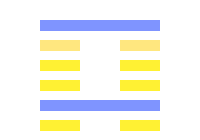
4.1.2.3.4.6 (4 > 55) - THE MĂNG HEXAGRAM
- 1. The first line, divided, (has respect to) the dispelling of ignorance. It will be advantageous to use punishment (for that purpose), and to remove the shackles (from the mind). But going on in that way (of punishment) will give occasion for regret.
- 2. The second line, undivided, (shows its subject) exercising forbearance with the ignorant, in which there will be good fortune; and admitting (even the goodness of women, which will also be fortunate. (He may be described also as) a son able to (sustain the burden of) his family.
- 3. The third line, divided, (seems to say) that one should not marry a woman whose emblem it might be, for that, when she sees a man of wealth, she will not keep her person from him, and in no wise will advantage come from her.
- 4. The fourth line, divided, (shows its subject as if) bound in chains of ignorance. There will be occasion for regret.
- 6. In the topmost line, undivided, we see one smiting the ignorant (youth). But no advantage will come from doing him an injury. Advantage would come from warding off injury from him.
4.1.2.3.4.6 (4 > 55) - Questioning
One prepares a true welcome to those who are deemed worthy to be honoured.
Bing DeepL Google Yandex4.1.2.3.4.6 (4 > 55) - Questioning
One prepares a true welcome to those who are deemed worthy of being honored.
Bing DeepL Google Yandex4.1.2.3.4.6 (4 > 55) - Meng, la stupidité juvénile
Meng : Intelligence non encore développée ; être non encore formé.
-
1. Pour dissiper l’ignorance, il faut user des châtiments.
Pour maintenir les règles en vigueur.
Il faut user d’avertissements et de punitions pour écarter toute cause de regret. -
2. Il est bien de se préoccuper de l’ignorant et de soutenir la jeune fille. Ainsi, ils pourront triompher de leur ignorance.
L’enfant fait durer la famille ; il faut en avoir soin.
Le fort et le faible doivent s’entraider. -
3. N’épousez pas une fille si elle ne considère que l’or, si elle ne se possède pas elle-même ; cela ne serait pas heureux.
Ce ne serait point agir convenablement.
C’est-à-dire une fille ayant la qualité dont il s’agit n’est pas à épouser. - 4. L’ignorance pauvre et abandonnée est chose funeste. L’abandon, l’isolement tient éloignée la possession de la vérité.
- 6. Si l’on châtie l’ignorant en le formant, on ne doit point lui faire de tort, mais au contraire l’en préserver.
4.1.2.3.4.6 (4 > 55) - Interroger
On prépare un accueil véritable à ceux que l'on estime dignes d'être honorés.
Bing DeepL Google Yandex4.1.2.3.4.6 (4 > 55) - Tanácskérés
- 1. Megmutatni a tanulónak a határokat amiken nem léphet túl, majd bizalmat adni neki.
- 2. Ha valaki barátságos és bizalmas tanár, bíznak benne.
- 3. Nem engedhet a fiatalabbak türelmetlenségének.
- 4. Ha valaki egyedül tanul, ez az ő döntése.
- 6. Elutasítani akik átlépik a határokat.

4.5.6 (4 > 29) - THE MĂNG HEXAGRAM
- 5. The fifth line, divided, shows its subject as a simple lad without experience. There will be good fortune.
- 6. In the topmost line, undivided, we see one smiting the ignorant (youth). But no advantage will come from doing him an injury. Advantage would come from warding off injury from him.
4.5.6 (4 > 29) - Questioning
More resources are planned so that others are received comfortably.
Bing DeepL Google Yandex4.5.6 (4 > 29) - Questioning
More resources are planned so that others are received comfortably.
Bing DeepL Google Yandex4.5.6 (4 > 29) - Meng, la stupidité juvénile
Meng : Intelligence non encore développée ; être non encore formé.
-
5. L’ignorant, tout jeune encore, peut arriver à bien (être instruit).
Le bien de son état est la docilité, la douceur. - 6. Si l’on châtie l’ignorant en le formant, on ne doit point lui faire de tort, mais au contraire l’en préserver.
4.5.6 (4 > 29) - Interroger
On prévoit plus de moyens pour que les autres soient reçus confortablement.
Bing DeepL Google Yandex4.5.6 (4 > 29) - Tanácskérés
- 5. Nem hagyja abba a kérdezést.
- 6. Elutasítani akik átlépik a határokat.

4.1.5.6 (4 > 60) - THE MĂNG HEXAGRAM
- 1. The first line, divided, (has respect to) the dispelling of ignorance. It will be advantageous to use punishment (for that purpose), and to remove the shackles (from the mind). But going on in that way (of punishment) will give occasion for regret.
- 5. The fifth line, divided, shows its subject as a simple lad without experience. There will be good fortune.
- 6. In the topmost line, undivided, we see one smiting the ignorant (youth). But no advantage will come from doing him an injury. Advantage would come from warding off injury from him.
4.1.5.6 (4 > 60) - Questioning
One will give tokens of friendship to those who have shown.
Bing DeepL Google Yandex4.1.5.6 (4 > 60) - Questioning
One will give tokens of friendship to those with who have shown.
Bing DeepL Google Yandex4.1.5.6 (4 > 60) - Meng, la stupidité juvénile
Meng : Intelligence non encore développée ; être non encore formé.
-
1. Pour dissiper l’ignorance, il faut user des châtiments.
Pour maintenir les règles en vigueur.
Il faut user d’avertissements et de punitions pour écarter toute cause de regret. -
5. L’ignorant, tout jeune encore, peut arriver à bien (être instruit).
Le bien de son état est la docilité, la douceur. - 6. Si l’on châtie l’ignorant en le formant, on ne doit point lui faire de tort, mais au contraire l’en préserver.
4.1.5.6 (4 > 60) - Interroger
On donnera des gages d'amitié à ceux qui ont montré.
Bing DeepL Google Yandex4.1.5.6 (4 > 60) - Tanácskérés
- 1. Megmutatni a tanulónak a határokat amiken nem léphet túl, majd bizalmat adni neki.
- 5. Nem hagyja abba a kérdezést.
- 6. Elutasítani akik átlépik a határokat.
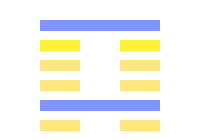
4.2.5.6 (4 > 8) - THE MĂNG HEXAGRAM
- 2. The second line, undivided, (shows its subject) exercising forbearance with the ignorant, in which there will be good fortune; and admitting (even the goodness of women, which will also be fortunate. (He may be described also as) a son able to (sustain the burden of) his family.
- 5. The fifth line, divided, shows its subject as a simple lad without experience. There will be good fortune.
- 6. In the topmost line, undivided, we see one smiting the ignorant (youth). But no advantage will come from doing him an injury. Advantage would come from warding off injury from him.
4.2.5.6 (4 > 8) - Questioning
One will have a lot of panache if they assume the consequences of their actions.
Bing DeepL Google Yandex4.2.5.6 (4 > 8) - Questioning
One will have a lot of panache if they assume the consequences of their actions.
Bing DeepL Google Yandex4.2.5.6 (4 > 8) - Meng, la stupidité juvénile
Meng : Intelligence non encore développée ; être non encore formé.
-
2. Il est bien de se préoccuper de l’ignorant et de soutenir la jeune fille. Ainsi, ils pourront triompher de leur ignorance.
L’enfant fait durer la famille ; il faut en avoir soin.
Le fort et le faible doivent s’entraider. -
5. L’ignorant, tout jeune encore, peut arriver à bien (être instruit).
Le bien de son état est la docilité, la douceur. - 6. Si l’on châtie l’ignorant en le formant, on ne doit point lui faire de tort, mais au contraire l’en préserver.
4.2.5.6 (4 > 8) - Interroger
On aura beaucoup de panache si l'on assume les conséquences de ses actions.
Bing DeepL Google Yandex4.2.5.6 (4 > 8) - Tanácskérés
- 2. Ha valaki barátságos és bizalmas tanár, bíznak benne.
- 5. Nem hagyja abba a kérdezést.
- 6. Elutasítani akik átlépik a határokat.
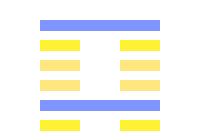
4.1.2.5.6 (4 > 3) - THE MĂNG HEXAGRAM
- 1. The first line, divided, (has respect to) the dispelling of ignorance. It will be advantageous to use punishment (for that purpose), and to remove the shackles (from the mind). But going on in that way (of punishment) will give occasion for regret.
- 2. The second line, undivided, (shows its subject) exercising forbearance with the ignorant, in which there will be good fortune; and admitting (even the goodness of women, which will also be fortunate. (He may be described also as) a son able to (sustain the burden of) his family.
- 5. The fifth line, divided, shows its subject as a simple lad without experience. There will be good fortune.
- 6. In the topmost line, undivided, we see one smiting the ignorant (youth). But no advantage will come from doing him an injury. Advantage would come from warding off injury from him.
4.1.2.5.6 (4 > 3) - Questioning
One leaves so that others know that they may continue without being observed.
Bing DeepL Google Yandex4.1.2.5.6 (4 > 3) - Questioning
One leaves so that others know that they may continue without being observed.
Bing DeepL Google Yandex4.1.2.5.6 (4 > 3) - Meng, la stupidité juvénile
Meng : Intelligence non encore développée ; être non encore formé.
-
1. Pour dissiper l’ignorance, il faut user des châtiments.
Pour maintenir les règles en vigueur.
Il faut user d’avertissements et de punitions pour écarter toute cause de regret. -
2. Il est bien de se préoccuper de l’ignorant et de soutenir la jeune fille. Ainsi, ils pourront triompher de leur ignorance.
L’enfant fait durer la famille ; il faut en avoir soin.
Le fort et le faible doivent s’entraider. -
5. L’ignorant, tout jeune encore, peut arriver à bien (être instruit).
Le bien de son état est la docilité, la douceur. - 6. Si l’on châtie l’ignorant en le formant, on ne doit point lui faire de tort, mais au contraire l’en préserver.
4.1.2.5.6 (4 > 3) - Interroger
On s'en va pour que les autres sachent qu'ils peuvent continuer sans qu'on les observe.
Bing DeepL Google Yandex4.1.2.5.6 (4 > 3) - Tanácskérés
- 1. Megmutatni a tanulónak a határokat amiken nem léphet túl, majd bizalmat adni neki.
- 2. Ha valaki barátságos és bizalmas tanár, bíznak benne.
- 5. Nem hagyja abba a kérdezést.
- 6. Elutasítani akik átlépik a határokat.

4.3.5.6 (4 > 48) - THE MĂNG HEXAGRAM
- 3. The third line, divided, (seems to say) that one should not marry a woman whose emblem it might be, for that, when she sees a man of wealth, she will not keep her person from him, and in no wise will advantage come from her.
- 5. The fifth line, divided, shows its subject as a simple lad without experience. There will be good fortune.
- 6. In the topmost line, undivided, we see one smiting the ignorant (youth). But no advantage will come from doing him an injury. Advantage would come from warding off injury from him.
4.3.5.6 (4 > 48) - Questioning
One thinks they will still have some attractions to bring in the most able and show them what one has designed.
Bing DeepL Google Yandex4.3.5.6 (4 > 48) - Questioning
One thinks they will still have some attractions to bring in the most able and show them what one has designed.
Bing DeepL Google Yandex4.3.5.6 (4 > 48) - Meng, la stupidité juvénile
Meng : Intelligence non encore développée ; être non encore formé.
-
3. N’épousez pas une fille si elle ne considère que l’or, si elle ne se possède pas elle-même ; cela ne serait pas heureux.
Ce ne serait point agir convenablement.
C’est-à-dire une fille ayant la qualité dont il s’agit n’est pas à épouser. -
5. L’ignorant, tout jeune encore, peut arriver à bien (être instruit).
Le bien de son état est la docilité, la douceur. - 6. Si l’on châtie l’ignorant en le formant, on ne doit point lui faire de tort, mais au contraire l’en préserver.
4.3.5.6 (4 > 48) - Interroger
On pense que l'on aura encore des attraits pour faire venir les plus compétents et leur montrer ce qu'on a conçu.
Bing DeepL Google Yandex4.3.5.6 (4 > 48) - Tanácskérés
- 3. Nem engedhet a fiatalabbak türelmetlenségének.
- 5. Nem hagyja abba a kérdezést.
- 6. Elutasítani akik átlépik a határokat.

4.1.3.5.6 (4 > 5) - THE MĂNG HEXAGRAM
- 1. The first line, divided, (has respect to) the dispelling of ignorance. It will be advantageous to use punishment (for that purpose), and to remove the shackles (from the mind). But going on in that way (of punishment) will give occasion for regret.
- 3. The third line, divided, (seems to say) that one should not marry a woman whose emblem it might be, for that, when she sees a man of wealth, she will not keep her person from him, and in no wise will advantage come from her.
- 5. The fifth line, divided, shows its subject as a simple lad without experience. There will be good fortune.
- 6. In the topmost line, undivided, we see one smiting the ignorant (youth). But no advantage will come from doing him an injury. Advantage would come from warding off injury from him.
4.1.3.5.6 (4 > 5) - Questioning
One would do well not to compromise oneself with dishonest people.
Bing DeepL Google Yandex4.1.3.5.6 (4 > 5) - Questioning
One would do well not to compromise oneself with dishonest people.
Bing DeepL Google Yandex4.1.3.5.6 (4 > 5) - Meng, la stupidité juvénile
Meng : Intelligence non encore développée ; être non encore formé.
-
1. Pour dissiper l’ignorance, il faut user des châtiments.
Pour maintenir les règles en vigueur.
Il faut user d’avertissements et de punitions pour écarter toute cause de regret. -
3. N’épousez pas une fille si elle ne considère que l’or, si elle ne se possède pas elle-même ; cela ne serait pas heureux.
Ce ne serait point agir convenablement.
C’est-à-dire une fille ayant la qualité dont il s’agit n’est pas à épouser. -
5. L’ignorant, tout jeune encore, peut arriver à bien (être instruit).
Le bien de son état est la docilité, la douceur. - 6. Si l’on châtie l’ignorant en le formant, on ne doit point lui faire de tort, mais au contraire l’en préserver.
4.1.3.5.6 (4 > 5) - Interroger
On fera bien de ne pas se compromettre avec des personnes malhonnêtes.
Bing DeepL Google Yandex4.1.3.5.6 (4 > 5) - Tanácskérés
- 1. Megmutatni a tanulónak a határokat amiken nem léphet túl, majd bizalmat adni neki.
- 3. Nem engedhet a fiatalabbak türelmetlenségének.
- 5. Nem hagyja abba a kérdezést.
- 6. Elutasítani akik átlépik a határokat.
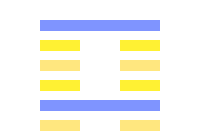
4.2.3.5.6 (4 > 39) - THE MĂNG HEXAGRAM
- 2. The second line, undivided, (shows its subject) exercising forbearance with the ignorant, in which there will be good fortune; and admitting (even the goodness of women, which will also be fortunate. (He may be described also as) a son able to (sustain the burden of) his family.
- 3. The third line, divided, (seems to say) that one should not marry a woman whose emblem it might be, for that, when she sees a man of wealth, she will not keep her person from him, and in no wise will advantage come from her.
- 5. The fifth line, divided, shows its subject as a simple lad without experience. There will be good fortune.
- 6. In the topmost line, undivided, we see one smiting the ignorant (youth). But no advantage will come from doing him an injury. Advantage would come from warding off injury from him.
4.2.3.5.6 (4 > 39) - Questioning
One will be ready to say things that others will not like to hear.
Bing DeepL Google Yandex4.2.3.5.6 (4 > 39) - Questioning
One will be ready to say things that others will not like to hear.
Bing DeepL Google Yandex4.2.3.5.6 (4 > 39) - Meng, la stupidité juvénile
Meng : Intelligence non encore développée ; être non encore formé.
-
2. Il est bien de se préoccuper de l’ignorant et de soutenir la jeune fille. Ainsi, ils pourront triompher de leur ignorance.
L’enfant fait durer la famille ; il faut en avoir soin.
Le fort et le faible doivent s’entraider. -
3. N’épousez pas une fille si elle ne considère que l’or, si elle ne se possède pas elle-même ; cela ne serait pas heureux.
Ce ne serait point agir convenablement.
C’est-à-dire une fille ayant la qualité dont il s’agit n’est pas à épouser. -
5. L’ignorant, tout jeune encore, peut arriver à bien (être instruit).
Le bien de son état est la docilité, la douceur. - 6. Si l’on châtie l’ignorant en le formant, on ne doit point lui faire de tort, mais au contraire l’en préserver.
4.2.3.5.6 (4 > 39) - Interroger
On sera prêt à dire des choses que les autres ne vont pas aimer entendre.
Bing DeepL Google Yandex4.2.3.5.6 (4 > 39) - Tanácskérés
- 2. Ha valaki barátságos és bizalmas tanár, bíznak benne.
- 3. Nem engedhet a fiatalabbak türelmetlenségének.
- 5. Nem hagyja abba a kérdezést.
- 6. Elutasítani akik átlépik a határokat.
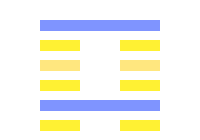
4.1.2.3.5.6 (4 > 63) - THE MĂNG HEXAGRAM
- 1. The first line, divided, (has respect to) the dispelling of ignorance. It will be advantageous to use punishment (for that purpose), and to remove the shackles (from the mind). But going on in that way (of punishment) will give occasion for regret.
- 2. The second line, undivided, (shows its subject) exercising forbearance with the ignorant, in which there will be good fortune; and admitting (even the goodness of women, which will also be fortunate. (He may be described also as) a son able to (sustain the burden of) his family.
- 3. The third line, divided, (seems to say) that one should not marry a woman whose emblem it might be, for that, when she sees a man of wealth, she will not keep her person from him, and in no wise will advantage come from her.
- 5. The fifth line, divided, shows its subject as a simple lad without experience. There will be good fortune.
- 6. In the topmost line, undivided, we see one smiting the ignorant (youth). But no advantage will come from doing him an injury. Advantage would come from warding off injury from him.
4.1.2.3.5.6 (4 > 63) - Questioning
One expects troubles so they get ready to fight.
Bing DeepL Google Yandex4.1.2.3.5.6 (4 > 63) - Questioning
One expects troubles so they get ready to fight.
Bing DeepL Google Yandex4.1.2.3.5.6 (4 > 63) - Meng, la stupidité juvénile
Meng : Intelligence non encore développée ; être non encore formé.
-
1. Pour dissiper l’ignorance, il faut user des châtiments.
Pour maintenir les règles en vigueur.
Il faut user d’avertissements et de punitions pour écarter toute cause de regret. -
2. Il est bien de se préoccuper de l’ignorant et de soutenir la jeune fille. Ainsi, ils pourront triompher de leur ignorance.
L’enfant fait durer la famille ; il faut en avoir soin.
Le fort et le faible doivent s’entraider. -
3. N’épousez pas une fille si elle ne considère que l’or, si elle ne se possède pas elle-même ; cela ne serait pas heureux.
Ce ne serait point agir convenablement.
C’est-à-dire une fille ayant la qualité dont il s’agit n’est pas à épouser. -
5. L’ignorant, tout jeune encore, peut arriver à bien (être instruit).
Le bien de son état est la docilité, la douceur. - 6. Si l’on châtie l’ignorant en le formant, on ne doit point lui faire de tort, mais au contraire l’en préserver.
4.1.2.3.5.6 (4 > 63) - Interroger
On prévoit des ennuis alors on se prépare à combattre.
Bing DeepL Google Yandex4.1.2.3.5.6 (4 > 63) - Tanácskérés
- 1. Megmutatni a tanulónak a határokat amiken nem léphet túl, majd bizalmat adni neki.
- 2. Ha valaki barátságos és bizalmas tanár, bíznak benne.
- 3. Nem engedhet a fiatalabbak türelmetlenségének.
- 5. Nem hagyja abba a kérdezést.
- 6. Elutasítani akik átlépik a határokat.

4.4.5.6 (4 > 47) - THE MĂNG HEXAGRAM
- 4. The fourth line, divided, (shows its subject as if) bound in chains of ignorance. There will be occasion for regret.
- 5. The fifth line, divided, shows its subject as a simple lad without experience. There will be good fortune.
- 6. In the topmost line, undivided, we see one smiting the ignorant (youth). But no advantage will come from doing him an injury. Advantage would come from warding off injury from him.
4.4.5.6 (4 > 47) - Questioning
One recovers strength until the others arrive.
Bing DeepL Google Yandex4.4.5.6 (4 > 47) - Questioning
One recovers strength until the others arrive.
Bing DeepL Google Yandex4.4.5.6 (4 > 47) - Meng, la stupidité juvénile
Meng : Intelligence non encore développée ; être non encore formé.
- 4. L’ignorance pauvre et abandonnée est chose funeste. L’abandon, l’isolement tient éloignée la possession de la vérité.
-
5. L’ignorant, tout jeune encore, peut arriver à bien (être instruit).
Le bien de son état est la docilité, la douceur. - 6. Si l’on châtie l’ignorant en le formant, on ne doit point lui faire de tort, mais au contraire l’en préserver.
4.4.5.6 (4 > 47) - Interroger
On récupère des forces en attendant que les autres arrivent.
Bing DeepL Google Yandex4.4.5.6 (4 > 47) - Tanácskérés
- 4. Ha valaki egyedül tanul, ez az ő döntése.
- 5. Nem hagyja abba a kérdezést.
- 6. Elutasítani akik átlépik a határokat.

4.1.4.5.6 (4 > 58) - THE MĂNG HEXAGRAM
- 1. The first line, divided, (has respect to) the dispelling of ignorance. It will be advantageous to use punishment (for that purpose), and to remove the shackles (from the mind). But going on in that way (of punishment) will give occasion for regret.
- 4. The fourth line, divided, (shows its subject as if) bound in chains of ignorance. There will be occasion for regret.
- 5. The fifth line, divided, shows its subject as a simple lad without experience. There will be good fortune.
- 6. In the topmost line, undivided, we see one smiting the ignorant (youth). But no advantage will come from doing him an injury. Advantage would come from warding off injury from him.
4.1.4.5.6 (4 > 58) - Questioning
One prepares others to do as if they were gifted.
Bing DeepL Google Yandex4.1.4.5.6 (4 > 58) - Questioning
One prepares others to do as if they were gifted.
Bing DeepL Google Yandex4.1.4.5.6 (4 > 58) - Meng, la stupidité juvénile
Meng : Intelligence non encore développée ; être non encore formé.
-
1. Pour dissiper l’ignorance, il faut user des châtiments.
Pour maintenir les règles en vigueur.
Il faut user d’avertissements et de punitions pour écarter toute cause de regret. - 4. L’ignorance pauvre et abandonnée est chose funeste. L’abandon, l’isolement tient éloignée la possession de la vérité.
-
5. L’ignorant, tout jeune encore, peut arriver à bien (être instruit).
Le bien de son état est la docilité, la douceur. - 6. Si l’on châtie l’ignorant en le formant, on ne doit point lui faire de tort, mais au contraire l’en préserver.
4.1.4.5.6 (4 > 58) - Interroger
On prépare les autres à faire comme si ils étaient doués.
Bing DeepL Google Yandex4.1.4.5.6 (4 > 58) - Tanácskérés
- 1. Megmutatni a tanulónak a határokat amiken nem léphet túl, majd bizalmat adni neki.
- 4. Ha valaki egyedül tanul, ez az ő döntése.
- 5. Nem hagyja abba a kérdezést.
- 6. Elutasítani akik átlépik a határokat.
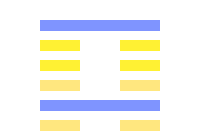
4.2.4.5.6 (4 > 45) - THE MĂNG HEXAGRAM
- 2. The second line, undivided, (shows its subject) exercising forbearance with the ignorant, in which there will be good fortune; and admitting (even the goodness of women, which will also be fortunate. (He may be described also as) a son able to (sustain the burden of) his family.
- 4. The fourth line, divided, (shows its subject as if) bound in chains of ignorance. There will be occasion for regret.
- 5. The fifth line, divided, shows its subject as a simple lad without experience. There will be good fortune.
- 6. In the topmost line, undivided, we see one smiting the ignorant (youth). But no advantage will come from doing him an injury. Advantage would come from warding off injury from him.
4.2.4.5.6 (4 > 45) - Questioning
Others are exerting pressures to make one lose confidence.
Bing DeepL Google Yandex4.2.4.5.6 (4 > 45) - Questioning
Others are exerting pressures to make one lose confidence.
Bing DeepL Google Yandex4.2.4.5.6 (4 > 45) - Meng, la stupidité juvénile
Meng : Intelligence non encore développée ; être non encore formé.
-
2. Il est bien de se préoccuper de l’ignorant et de soutenir la jeune fille. Ainsi, ils pourront triompher de leur ignorance.
L’enfant fait durer la famille ; il faut en avoir soin.
Le fort et le faible doivent s’entraider. - 4. L’ignorance pauvre et abandonnée est chose funeste. L’abandon, l’isolement tient éloignée la possession de la vérité.
-
5. L’ignorant, tout jeune encore, peut arriver à bien (être instruit).
Le bien de son état est la docilité, la douceur. - 6. Si l’on châtie l’ignorant en le formant, on ne doit point lui faire de tort, mais au contraire l’en préserver.
4.2.4.5.6 (4 > 45) - Interroger
Les autres exercent des pressions pour que l'on perde confiance.
Bing DeepL Google Yandex4.2.4.5.6 (4 > 45) - Tanácskérés
- 2. Ha valaki barátságos és bizalmas tanár, bíznak benne.
- 4. Ha valaki egyedül tanul, ez az ő döntése.
- 5. Nem hagyja abba a kérdezést.
- 6. Elutasítani akik átlépik a határokat.
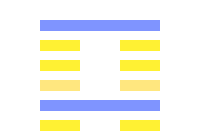
4.1.2.4.5.6 (4 > 17) - THE MĂNG HEXAGRAM
- 1. The first line, divided, (has respect to) the dispelling of ignorance. It will be advantageous to use punishment (for that purpose), and to remove the shackles (from the mind). But going on in that way (of punishment) will give occasion for regret.
- 2. The second line, undivided, (shows its subject) exercising forbearance with the ignorant, in which there will be good fortune; and admitting (even the goodness of women, which will also be fortunate. (He may be described also as) a son able to (sustain the burden of) his family.
- 4. The fourth line, divided, (shows its subject as if) bound in chains of ignorance. There will be occasion for regret.
- 5. The fifth line, divided, shows its subject as a simple lad without experience. There will be good fortune.
- 6. In the topmost line, undivided, we see one smiting the ignorant (youth). But no advantage will come from doing him an injury. Advantage would come from warding off injury from him.
4.1.2.4.5.6 (4 > 17) - Questioning
One is often referring to those who have impressed them the most.
Bing DeepL Google Yandex4.1.2.4.5.6 (4 > 17) - Questioning
One is often referring to those who have impressed them the most.
Bing DeepL Google Yandex4.1.2.4.5.6 (4 > 17) - Meng, la stupidité juvénile
Meng : Intelligence non encore développée ; être non encore formé.
-
1. Pour dissiper l’ignorance, il faut user des châtiments.
Pour maintenir les règles en vigueur.
Il faut user d’avertissements et de punitions pour écarter toute cause de regret. -
2. Il est bien de se préoccuper de l’ignorant et de soutenir la jeune fille. Ainsi, ils pourront triompher de leur ignorance.
L’enfant fait durer la famille ; il faut en avoir soin.
Le fort et le faible doivent s’entraider. - 4. L’ignorance pauvre et abandonnée est chose funeste. L’abandon, l’isolement tient éloignée la possession de la vérité.
-
5. L’ignorant, tout jeune encore, peut arriver à bien (être instruit).
Le bien de son état est la docilité, la douceur. - 6. Si l’on châtie l’ignorant en le formant, on ne doit point lui faire de tort, mais au contraire l’en préserver.
4.1.2.4.5.6 (4 > 17) - Interroger
On fait souvent allusion à ceux qui nous ont le plus marqué.
Bing DeepL Google Yandex4.1.2.4.5.6 (4 > 17) - Tanácskérés
- 1. Megmutatni a tanulónak a határokat amiken nem léphet túl, majd bizalmat adni neki.
- 2. Ha valaki barátságos és bizalmas tanár, bíznak benne.
- 4. Ha valaki egyedül tanul, ez az ő döntése.
- 5. Nem hagyja abba a kérdezést.
- 6. Elutasítani akik átlépik a határokat.

4.3.4.5.6 (4 > 28) - THE MĂNG HEXAGRAM
- 3. The third line, divided, (seems to say) that one should not marry a woman whose emblem it might be, for that, when she sees a man of wealth, she will not keep her person from him, and in no wise will advantage come from her.
- 4. The fourth line, divided, (shows its subject as if) bound in chains of ignorance. There will be occasion for regret.
- 5. The fifth line, divided, shows its subject as a simple lad without experience. There will be good fortune.
- 6. In the topmost line, undivided, we see one smiting the ignorant (youth). But no advantage will come from doing him an injury. Advantage would come from warding off injury from him.
4.3.4.5.6 (4 > 28) - Questioning
One promises others that one will be willing to do what they ask.
Bing DeepL Google Yandex4.3.4.5.6 (4 > 28) - Questioning
One promises others that one will be willing to do what they ask.
Bing DeepL Google Yandex4.3.4.5.6 (4 > 28) - Meng, la stupidité juvénile
Meng : Intelligence non encore développée ; être non encore formé.
-
3. N’épousez pas une fille si elle ne considère que l’or, si elle ne se possède pas elle-même ; cela ne serait pas heureux.
Ce ne serait point agir convenablement.
C’est-à-dire une fille ayant la qualité dont il s’agit n’est pas à épouser. - 4. L’ignorance pauvre et abandonnée est chose funeste. L’abandon, l’isolement tient éloignée la possession de la vérité.
-
5. L’ignorant, tout jeune encore, peut arriver à bien (être instruit).
Le bien de son état est la docilité, la douceur. - 6. Si l’on châtie l’ignorant en le formant, on ne doit point lui faire de tort, mais au contraire l’en préserver.
4.3.4.5.6 (4 > 28) - Interroger
On promet aux autres que l'on sera disposé à faire ce qu'ils demandent.
Bing DeepL Google Yandex4.3.4.5.6 (4 > 28) - Tanácskérés
- 3. Nem engedhet a fiatalabbak türelmetlenségének.
- 4. Ha valaki egyedül tanul, ez az ő döntése.
- 5. Nem hagyja abba a kérdezést.
- 6. Elutasítani akik átlépik a határokat.

4.1.3.4.5.6 (4 > 43) - THE MĂNG HEXAGRAM
- 1. The first line, divided, (has respect to) the dispelling of ignorance. It will be advantageous to use punishment (for that purpose), and to remove the shackles (from the mind). But going on in that way (of punishment) will give occasion for regret.
- 3. The third line, divided, (seems to say) that one should not marry a woman whose emblem it might be, for that, when she sees a man of wealth, she will not keep her person from him, and in no wise will advantage come from her.
- 4. The fourth line, divided, (shows its subject as if) bound in chains of ignorance. There will be occasion for regret.
- 5. The fifth line, divided, shows its subject as a simple lad without experience. There will be good fortune.
- 6. In the topmost line, undivided, we see one smiting the ignorant (youth). But no advantage will come from doing him an injury. Advantage would come from warding off injury from him.
4.1.3.4.5.6 (4 > 43) - Questioning
One assesses the chances of reaching their goal.
Bing DeepL Google Yandex4.1.3.4.5.6 (4 > 43) - Questioning
One assesses the chances of reaching their goal.
Bing DeepL Google Yandex4.1.3.4.5.6 (4 > 43) - Meng, la stupidité juvénile
Meng : Intelligence non encore développée ; être non encore formé.
-
1. Pour dissiper l’ignorance, il faut user des châtiments.
Pour maintenir les règles en vigueur.
Il faut user d’avertissements et de punitions pour écarter toute cause de regret. -
3. N’épousez pas une fille si elle ne considère que l’or, si elle ne se possède pas elle-même ; cela ne serait pas heureux.
Ce ne serait point agir convenablement.
C’est-à-dire une fille ayant la qualité dont il s’agit n’est pas à épouser. - 4. L’ignorance pauvre et abandonnée est chose funeste. L’abandon, l’isolement tient éloignée la possession de la vérité.
-
5. L’ignorant, tout jeune encore, peut arriver à bien (être instruit).
Le bien de son état est la docilité, la douceur. - 6. Si l’on châtie l’ignorant en le formant, on ne doit point lui faire de tort, mais au contraire l’en préserver.
4.1.3.4.5.6 (4 > 43) - Interroger
On évalue les chances d'atteindre son but.
Bing DeepL Google Yandex4.1.3.4.5.6 (4 > 43) - Tanácskérés
- 1. Megmutatni a tanulónak a határokat amiken nem léphet túl, majd bizalmat adni neki.
- 3. Nem engedhet a fiatalabbak türelmetlenségének.
- 4. Ha valaki egyedül tanul, ez az ő döntése.
- 5. Nem hagyja abba a kérdezést.
- 6. Elutasítani akik átlépik a határokat.
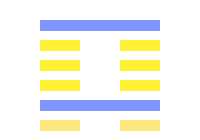
4.2.3.4.5.6 (4 > 31) - THE MĂNG HEXAGRAM
- 2. The second line, undivided, (shows its subject) exercising forbearance with the ignorant, in which there will be good fortune; and admitting (even the goodness of women, which will also be fortunate. (He may be described also as) a son able to (sustain the burden of) his family.
- 3. The third line, divided, (seems to say) that one should not marry a woman whose emblem it might be, for that, when she sees a man of wealth, she will not keep her person from him, and in no wise will advantage come from her.
- 4. The fourth line, divided, (shows its subject as if) bound in chains of ignorance. There will be occasion for regret.
- 5. The fifth line, divided, shows its subject as a simple lad without experience. There will be good fortune.
- 6. In the topmost line, undivided, we see one smiting the ignorant (youth). But no advantage will come from doing him an injury. Advantage would come from warding off injury from him.
4.2.3.4.5.6 (4 > 31) - Questioning
One raises a question that interests those who dared not to ask it.
Bing DeepL Google Yandex4.2.3.4.5.6 (4 > 31) - Questioning
One raises a question that interests those who dared not to ask it.
Bing DeepL Google Yandex4.2.3.4.5.6 (4 > 31) - Meng, la stupidité juvénile
Meng : Intelligence non encore développée ; être non encore formé.
-
2. Il est bien de se préoccuper de l’ignorant et de soutenir la jeune fille. Ainsi, ils pourront triompher de leur ignorance.
L’enfant fait durer la famille ; il faut en avoir soin.
Le fort et le faible doivent s’entraider. -
3. N’épousez pas une fille si elle ne considère que l’or, si elle ne se possède pas elle-même ; cela ne serait pas heureux.
Ce ne serait point agir convenablement.
C’est-à-dire une fille ayant la qualité dont il s’agit n’est pas à épouser. - 4. L’ignorance pauvre et abandonnée est chose funeste. L’abandon, l’isolement tient éloignée la possession de la vérité.
-
5. L’ignorant, tout jeune encore, peut arriver à bien (être instruit).
Le bien de son état est la docilité, la douceur. - 6. Si l’on châtie l’ignorant en le formant, on ne doit point lui faire de tort, mais au contraire l’en préserver.
4.2.3.4.5.6 (4 > 31) - Interroger
On soulève une question qui intéresse ceux qui n'ont pas osé la poser.
Bing DeepL Google Yandex4.2.3.4.5.6 (4 > 31) - Tanácskérés
- 2. Ha valaki barátságos és bizalmas tanár, bíznak benne.
- 3. Nem engedhet a fiatalabbak türelmetlenségének.
- 4. Ha valaki egyedül tanul, ez az ő döntése.
- 5. Nem hagyja abba a kérdezést.
- 6. Elutasítani akik átlépik a határokat.
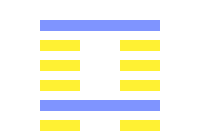
4.1.2.3.4.5.6 (4 > 49) - THE MĂNG HEXAGRAM
- 1. The first line, divided, (has respect to) the dispelling of ignorance. It will be advantageous to use punishment (for that purpose), and to remove the shackles (from the mind). But going on in that way (of punishment) will give occasion for regret.
- 2. The second line, undivided, (shows its subject) exercising forbearance with the ignorant, in which there will be good fortune; and admitting (even the goodness of women, which will also be fortunate. (He may be described also as) a son able to (sustain the burden of) his family.
- 3. The third line, divided, (seems to say) that one should not marry a woman whose emblem it might be, for that, when she sees a man of wealth, she will not keep her person from him, and in no wise will advantage come from her.
- 4. The fourth line, divided, (shows its subject as if) bound in chains of ignorance. There will be occasion for regret.
- 5. The fifth line, divided, shows its subject as a simple lad without experience. There will be good fortune.
- 6. In the topmost line, undivided, we see one smiting the ignorant (youth). But no advantage will come from doing him an injury. Advantage would come from warding off injury from him.
4.1.2.3.4.5.6 (4 > 49) - Questioning
One wants to use items that others do not want to return.
Bing DeepL Google Yandex4.1.2.3.4.5.6 (4 > 49) - Questioning
One wants to use items that others do not want to return.
Bing DeepL Google Yandex4.1.2.3.4.5.6 (4 > 49) - Meng, la stupidité juvénile
Meng : Intelligence non encore développée ; être non encore formé.
-
1. Pour dissiper l’ignorance, il faut user des châtiments.
Pour maintenir les règles en vigueur.
Il faut user d’avertissements et de punitions pour écarter toute cause de regret. -
2. Il est bien de se préoccuper de l’ignorant et de soutenir la jeune fille. Ainsi, ils pourront triompher de leur ignorance.
L’enfant fait durer la famille ; il faut en avoir soin.
Le fort et le faible doivent s’entraider. -
3. N’épousez pas une fille si elle ne considère que l’or, si elle ne se possède pas elle-même ; cela ne serait pas heureux.
Ce ne serait point agir convenablement.
C’est-à-dire une fille ayant la qualité dont il s’agit n’est pas à épouser. - 4. L’ignorance pauvre et abandonnée est chose funeste. L’abandon, l’isolement tient éloignée la possession de la vérité.
-
5. L’ignorant, tout jeune encore, peut arriver à bien (être instruit).
Le bien de son état est la docilité, la douceur. - 6. Si l’on châtie l’ignorant en le formant, on ne doit point lui faire de tort, mais au contraire l’en préserver.
4.1.2.3.4.5.6 (4 > 49) - Interroger
On souhaite utiliser des objets que les autres ne veulent pas rendre.
Bing DeepL Google Yandex4.1.2.3.4.5.6 (4 > 49) - Tanácskérés
- 1. Megmutatni a tanulónak a határokat amiken nem léphet túl, majd bizalmat adni neki.
- 2. Ha valaki barátságos és bizalmas tanár, bíznak benne.
- 3. Nem engedhet a fiatalabbak türelmetlenségének.
- 4. Ha valaki egyedül tanul, ez az ő döntése.
- 5. Nem hagyja abba a kérdezést.
- 6. Elutasítani akik átlépik a határokat.

